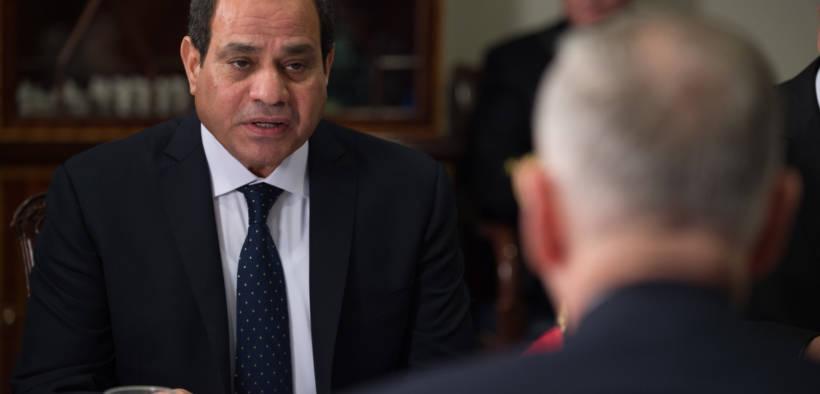Calm After the Storm: The Unanswered Demands of Egyptian Protestors

The most recent round of protests started on September 20th, and despite their rarity in the North African nation, the government was swift and brutal in its retaliation.
The Egyptian government remains complacent even after the largest protest since the Arab Spring shook the regime’s authority. While the situation in Egypt has calmed down, the government has not attempted to fix what Egyptians having been demanding, and it is just a matter of time until protestors take to the streets once again to fight against the regime.
In September, protests crowded the streets of Egypt as citizens hurled accusations of corruption, graft, waste, and ignoring the people’s needs at the government. The government responded predictably—with force and suppression—but it seems that it has been largely quelled for the time being. Nevertheless, unrest remains in the air, and driven by this new political upheaval Abdel Fattah Al-Sisi’s regime continues to be on high alert.
Corruption and graft rumors are nothing new in Egypt, but they have not gained traction beyond that in several years. The main question, then, is what is different now than since the Arab Spring? Mainly, it has been the allegations, many apparently well-founded and thorough, made by a former businessman turned actor through a series of videos released online.
The mass release of these videos, and the grassroots twitter campaign that started as a consequence, led to weeks of protests that have been met with aggression from the government, and once again put Egypt on the brink of chaos. As the Egyptian people’s dissent grows, it is worth understanding just who and what drove this new movement.
Long-Simmering Dissent Boils Over
The most recent round of protests started on September 20th, and despite their rarity in the North African nation, the government was >swift and brutal in its retaliation. The upheaval was largely propagated on social media, with hashtags such as the Arab #ThePeopleDemandTheFallOfTheRegime trending in the days before people took to the streets. The protests portrayed growing discontent over the Sisi regime, which swept to power after a coup in 2013 and has installed a brutally repressive and ineffective government.
The Sisi regime has overseen a government that has resulted in over32 million Egyptians living under the poverty line, years of harsh austerity measures that have stalled economic growth and inflated prices for even basic goods. Moreover, Egypt has become synonymous with severe repression of speech and basic rights and is a dangerous place for dissidence. Even so, the country’s populace took to the streets several times since September 20, despite the government’s violent response.
During the month of September, the Sisi regime arrested at least 4,000 people, including journalists, government critics, and even children in some reported instances. Moreover, there are several reports that prisoners—including journalists—have been tortured and abused during their detention. The government also limited access to the internet, including blocking multiple websites, restricting social media, and severely censored the press.
On the surface, such unrest seems surprising, but while it is sudden it was by no means spontaneous.
The Spark that Lit the Fuse
Before the protests began on September 20, an Egyptian actor and former businessman released a series of videos from his exile in Spain that alleged and pulled back the veil on gross corruption within the Sisi regime. Mohamed Ali, a former military contractor and part of the ruling party’s preferred citizens, laid out in rich detail the accusations and evidence he claimed to have about abuses of power.
To be clear, none of Sisi’s allegations should be wholly surprising, given the longstanding rumors and speculation of graft and rampant corruption in Egypt. However, Ali’s claims were backed by what seems to be hard evidence from a source that was once privy to insider information. These accusations include the military wasting public funds on pointless and vanity-driven construction projects (for which Ali claims the government still owes him over $13 million), as well as claims that Sisi’s wife ordered opulent redecorations and the construction of several palaces.
While the claims seemed empty at first, the panicked reaction from the government—including Sisi’s own admission that palaces were indeed being built gave Ali’s videos significant legitimacy and have reawakened the rebellious spirit in the Egyptian people. More importantly, Ali’s deep ties with the Egyptian military — his family has a long history of service and connections — as well as his position as a contractor and sometimes mouthpiece make him a credible source.
Moreover, the Egyptian government attempted to smear Ali’s reputation by claiming he belongs to the Muslim Brotherhood and other Islamist groups, though Ali strongly denied these claims. Following his initial videos revealing corruption, Ali made another calling for demonstrations and marching on the streets, setting up a showdown between the people and the Sisi regime, which will by no means fade away anytime soon.
A Powder Keg and A Short Fuse
The Sisi regime has shown its willingness to come down with a sledgehammer if necessary, to keep its hold on power and the populace under control. Even so, with a new charismatic figure in the lead and a population that has suffered through six years of stagnation, inflation, and oppression, this may be a wrong-footed strategy.
While the situation has calmed down, the root causes of the protests have not disappeared. As the situation worsens in Egypt, protests will re-emerge and more figures like Ali who sense the weakness dormant in the regime and who seek change will appear, and it may be too late for Sisi and his administration to prevent.







